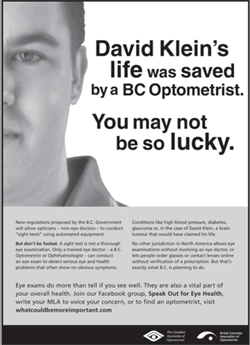As of May 1, major legislative changes to the Health Professions Act:

The BCAO ran this and other ads to emphasize the importance of eye exams.
• Remove restrictions that allow only opticians or optometrists, or workers supervised by them, to dispense contacts or glasses.
• Allow individuals to order contact lenses or glasses online without having to give the seller a copy of their prescription, sight test assessment or contact lens specification.
• Require British Columbia opticians and optometrists to give clients, free of charge, a copy of their prescription, sight test assessment or contact lens specifications––whether or not the client requests it––and also to give a copy, free of charge, to a third-party eyewear seller or other person, if requested by the client.
The British Columbia Association of Optometrists (BCAO) and individual O.D.s there, as well as other eye care providers and organizations throughout North America, have vehemently opposed the new regulations.
In an a letter addressed to BCAO members on April 30, BCAO president Antoinette Dumalo, O.D., wrote, “I met with [British Columbia’s Health Services] Minister Kevin Falcon … and received very disappointing news that he has no intention of withdrawing the regulatory changes or making alterations to them.”
She added, “It is unbelievable that we will become the only jurisdiction in North America to allow automated refraction, and eyeglass and contact lens sales without verification of a prescription––a very sad day for consumers in British Columbia and for the professionals committed to delivering quality eye health.”
Nevertheless, “The BCAO has no intention of reducing our efforts to educate Members of the Legislative Assembly (MLAs), the media and the general public. Deregulating eye exams, allowing opticians to independently provide automated refractions and allowing the unregulated sale of eyewear will most certainly put British Columbian’s eye sight and health at risk.” Dr. Dumalo wrote.
Citing a study that one in seven patients unknowingly has an asymptomatic ocular disease, the BCAO says the elimination of the eye exam requirement will increase cases of undetected eye disease.1
“More than ever, we need you to continue to collect case studies of asymptomatic adult patients 19 to 64 years old to prove the Minister wrong when he says there is no evidence that eye examinations improve health outcomes,” Dr. Dumalo wrote. “We will be sending you a form to make it easier to collect patient case studies related to asymptomatic eye disease, adverse impacts from the use of contact lenses and eyeglasses sold by unregulated retailers, and automated refraction that results in misdiagnoses.”
Since the announcement of the legislative changes in mid March, Dr. Dumalo has urged all eye care providers and patients in North America to support the BCAO in its efforts to overturn the new laws. “Despite being unable to convince Minister Falcon, we have been very successful in bringing this issue to the public’s attention through the efforts of BCAO members, our media relations and Facebook campaign, and our paid advertising,” she said. “Rest assured––the battle is not over. But, we will need you to join us in our continued efforts to ensure this government understands the negative consequences of their decision.”
To support the BCAO in its campaign against the legislative changes, visit www.optometrists.bc.ca. Click on the “Speak Out for Eye Heath” button on the left, and follow the on-screen instructions on how to send a message to Canadian government officials.
Robinson BE. Prevalence of asymptomatic eye disease. Can J Optom. 2003 Fall;65(5):175-80.

